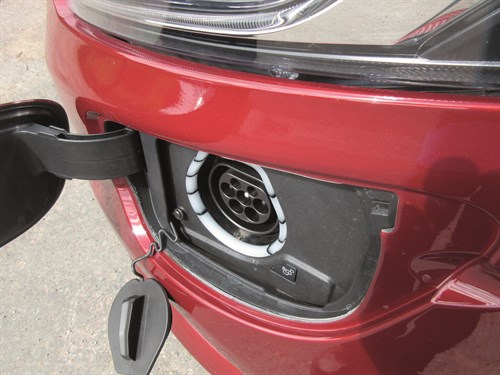- New Maxus EVs include eDeliver 5 van
- Used LCV values reach six-month high
- ADVERTISEMENT FEATURE: IVECO Daily Mission Awards 2024 Q2 Round-up: Grounds Maintenance & Forestry
- Stellantis Pro One electric vans review
- Mitie adds 5,000th EV to fleet
- Record number of CVs now on UK roads, SMMT reports
- Tyres: The path of least resistance
- ETRUX receives Ford Pro Convertor status
- The Logistics Organisation adds to van fleet with Vanaways
- Northgate launches micromobility service
The What Van? Road Test: Ford Transit Custom PHEV (2020)
Date: Monday, November 30, 2020

Operating
Service intervals are set at two years/18,000 miles with an annual inspection recommended. The Custom PHEV is covered by a three-year/100,000-mile warranty, with the battery warranted for eight years/100,000 miles.
Ford quotes an official fuel consumption figure of almost 92mpg, but that should be treated with a good deal of caution.
You should do considerably better if you are on short-haul local work, rely on the battery and keep it charged up from the mains, but will do considerably worse on long runs when you have to depend on the petrol generator. That can reduce the figure to closer to 44mpg.
One of the potential problems with plug-in hybrids is the risk that they will never be plugged in, and that the engine will become the sole source of charge for the battery. That means there will be no zero-emission running, which defeats the object of the exercise.
You can recharge the battery in about 4.3 hours if you plug your van into a 240V 10A domestic power socket, says Ford. If you have access to a commercial Type-2 AC charger then it should take no more than around 2.7 hours, it adds.
The van looks expensive compared with its diesel counterparts. Admittedly, it qualifies for the government’s Plug-in Van Grant of up to £8,000, but all this does in effect is wipe out the VAT, and registered businesses can reclaim VAT anyway. All the prices What Van? quotes in its road tests exclude VAT.
Ford Transit Custom Limited 1.0-litre EcoBoost PHEV
Price (ex VAT) £43,925
Price range (ex VAT) £23,040-£43,925
Gross payload 1,165kg
Load length 2,554mm
Load width (min/max) 1,351/1,775mm
Load bay height 1,406mm
Load volume 6.0m3
Loading height 564mm
Rear door aperture 1,404 x 1,347mm
Side door aperture 1,030 x 1,324mm
Gross vehicle weight 3,400kg
Braked trailer towing weight n/a
Residual value 23.1%*
Cost per mile 51.4p (inc PiVG)*
Engine size/power 92.9kW electric motor/1.0-litre EcoBoost petrol range extender
Torque 355Nm
Gearbox 1-spd
Fuel economy 91.7mpg
Battery 13.6kWh lithium-ion
CO2 60g/km
Warranty 3yrs/100,000mls
Service intervals 2yrs/18,000mls
Insurance group tbc
Price as tested £45,425
* after 4yrs/80,000 miles
source: KwikCarcost
Options
Metallic paint £650
Enhanced Park Assist £300
Visibility Pack – Premium £550
Rivals
Citroen Dispatch
Price (ex VAT) £23,645-£42,380
Load volume 4.6-6.1m3
Gross payload 960-1,469kg
Engines 100hp 1.5 diesel, 120hp, 150hp, 180hp 2.0 diesel, 100kW battery-electric
Verdict: The big Dispatch news is the arrival of an EV model with a claimed range of up to 211 miles depending on the battery pack you pick. The Dispatch is also sold through Peugeot dealers as the Expert and by Vauxhall dealers as the Vivaro, and they too are produced in battery-electric guise. Toyota’s Proace shares the same platform and overall design, and an electric model is in the pipeline.
Renault Trafic
Price (ex VAT) £24,150-£35,400
Load volume 5.2-8.6m3
Gross payload 1,036-1,255kg
Engines 120hp, 145hp, 170hp diesel
Verdict: Subjected to an extensive revamp recently, with new engines plus the Efficient Dual Clutch gearbox offered for the first time, the Trafic is a useful workhorse. But it lacks some of the more sophisticated safety systems offered on some of its key rivals; a lack Renault needs to address. Nor is it marketed in battery-electric or plug-in hybrid guise. The Trafic is also sold by partner brand Nissan as the NV300 and by Fiat Professional as the Talento.
VW Transporter
Price (ex VAT) £22,115-£49,290
Load volume 5.8-9.3m3
Gross payload 713-1,309kg
Engines 90hp, 110hp, 150hp, 199hp 2.0 diesel, 83kW battery-electric
Verdict: The Transporter is the gold standard for second-hand values, and it’s not hard to see why. VW’s build quality can scarcely be bettered, and the van’s safety standards are very high. Strong engines and a slick gear-change, and the arrival of a battery-electric van produced with ABT completes a largely positive picture. Interior and exterior styling are lacklustre though.
The Final Verdict
Design 7/10 – Needs two power sources to offer best of both worlds, which becomes pricey
Cabin 8/10 – A well-equipped, comfortable working environment
Ride 6/10 – Not as impressive as we’ve experienced in the past, especially when unladen
Refinement 6/10 – Quiet on battery power, but can get noisy when you bring in the petrol engine
Load area 8/10 – Low loading height. Bulkhead should protect occupants from shifting loads
Handling/performance 7/10 – Former we cannot praise highly enough; latter inadequate for long-haul work
Engine/transmission 7/10 – Clever, complex package may raise concerns about long-term dependability
Standard equipment 8/10 – Limited trim gives you a decent selection of goodies
Operating costs 7/10 – Acquisition price is on the steep side, but running costs can be low
What Van? subjective rating 7/10 – Stop-gap until pure battery-electrics of its size with matching range come
Overall Rating: 71/100
View The WhatVan Digital Edition


